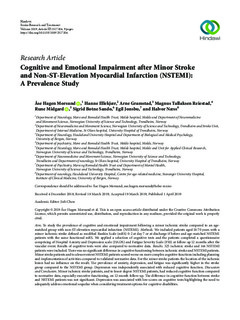| dc.contributor.author | Morsund, Åse Hagen | |
| dc.contributor.author | Ellekjær, Hanne | |
| dc.contributor.author | Gramstad, Arne | |
| dc.contributor.author | Reiestad, Magnus Tallaksen | |
| dc.contributor.author | Midgard, Rune | |
| dc.contributor.author | Sando, Sigrid Botne | |
| dc.contributor.author | Jonsbu, Egil | |
| dc.contributor.author | Næss, Halvor | |
| dc.date.accessioned | 2019-10-04T07:51:55Z | |
| dc.date.available | 2019-10-04T07:51:55Z | |
| dc.date.created | 2019-08-07T11:16:32Z | |
| dc.date.issued | 2019 | |
| dc.identifier.citation | Stroke Research and Treatment. 2019, 2527384 | nb_NO |
| dc.identifier.issn | 2090-8105 | |
| dc.identifier.uri | http://hdl.handle.net/11250/2620205 | |
| dc.description.abstract | Aim. To study the prevalence of cognitive and emotional impairment following a minor ischemic stroke compared to an age-matched group with non-ST-elevation myocardial infarction (NSTEMI). Methods. We included patients aged 18-70 years with a minor ischemic stroke defined as modified Rankin Scale (mRS) 0-2 at day 7 or at discharge if before and age-matched NSTEMI patients with the same functional mRS. We applied a selection of cognitive tests and the patients completed a questionnaire comprising of Hospital Anxiety and Depression scale (HADS) and Fatigue Severity Scale (FSS) at follow-up 12 months after the vascular event. Results of cognitive tests were also compared to normative data. Results. 325 ischemic stroke and 144 NSTEMI patients were included. There was no significant difference in cognitive functioning between ischemic stroke and NSTEMI patients. Minor stroke patients and to a lesser extent NSTEMI patients scored worse on more complex cognitive functions including planning and implementation of activities compared to validated normative data. For the minor stroke patients the location of the ischemic lesion had no influence on the result. The prevalence of anxiety, depression, and fatigue was significantly higher in the stroke group compared to the NSTEMI group. Depression was independently associated with reduced cognitive function. Discussion and Conclusion. Minor ischemic stroke patients, and to lesser degree NSTEMI patients, had reduced cognitive function compared to normative data, especially executive functioning, on 12-month follow-up. The difference in cognitive function between stroke and NSTEMI patients was not significant. Depression was associated with low scores on cognitive tests highlighting the need to adequately address emotional sequelae when considering treatment options for cognitive disabilities. | nb_NO |
| dc.language.iso | eng | nb_NO |
| dc.publisher | Hindawi | nb_NO |
| dc.rights | Navngivelse 4.0 Internasjonal | * |
| dc.rights.uri | http://creativecommons.org/licenses/by/4.0/deed.no | * |
| dc.title | Cognitive and Emotional Impairment after Minor Stroke and Non-ST-Elevation Myocardial Infarction (NSTEMI): A Prevalence Study | nb_NO |
| dc.type | Journal article | nb_NO |
| dc.type | Peer reviewed | nb_NO |
| dc.description.version | publishedVersion | nb_NO |
| dc.source.volume | 2019 | nb_NO |
| dc.source.journal | Stroke Research and Treatment | nb_NO |
| dc.identifier.doi | 10.1155/2019/2527384 | |
| dc.identifier.cristin | 1714533 | |
| dc.description.localcode | Copyright © 2019 Åse Hagen Morsund et al. This is an open access article distributed under the Creative Commons Attribution License, which permits unrestricted use, distribution, and reproduction in any medium, provided the original work is properly cited. | nb_NO |
| cristin.unitcode | 194,65,30,0 | |
| cristin.unitcode | 1920,15,0,0 | |
| cristin.unitcode | 194,65,0,0 | |
| cristin.unitcode | 1920,16,0,0 | |
| cristin.unitcode | 194,65,35,0 | |
| cristin.unitname | Institutt for nevromedisin og bevegelsesvitenskap | |
| cristin.unitname | Medisinsk klinikk | |
| cristin.unitname | Fakultet for medisin og helsevitenskap | |
| cristin.unitname | Nevroklinikken | |
| cristin.unitname | Institutt for psykisk helse | |
| cristin.ispublished | true | |
| cristin.fulltext | original | |
| cristin.qualitycode | 1 | |

